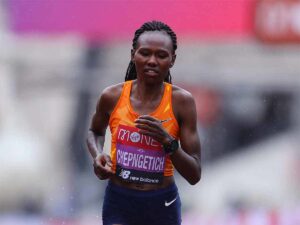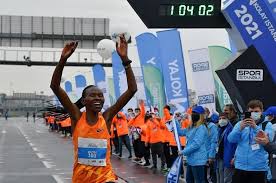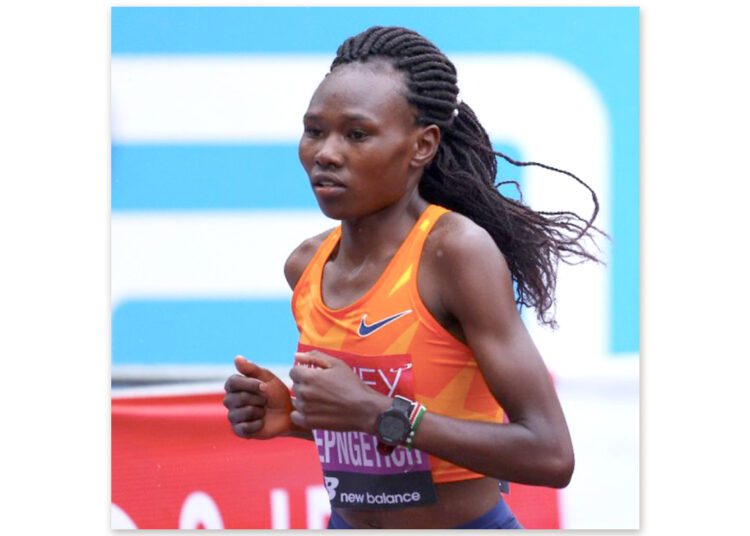NAIROBI – Kenya’s Olympic marathon contender Ruth Chepngetich has had a remarkable year in which she had to cope with the restrictions on training and racing brought about by the Covid-19 pandemic but managed to smash the half-marathon world record.
When the 26-year-old Chepngetich was getting ready for the Istanbul Half Marathon in April she was just focused on running a good, confident race but she ended up obliterating the world record by 29 seconds and fulfilling a dream.
“I was thinking about ‘world record, world record,’ I can (now) say… in Istanbul, I broke the world record,” Chepngetich told Reuters in an interview.
Following her impressive victory in Turkey, the 2019 world marathon champion set up camp in Ngong, an hour from Kenya’s capital Nairobi to get ready for the Tokyo Olympics.
Among her competitors in the marathon will be compatriot and world record holder Brigid Kosgei.
Chepngetich understands that her own strong performances have turned up the pressure.
“I say I should focus at these Games because everybody now has an eye on me,” she said. “I think when somebody is on a high level, there is a lot of pressure there.”

But Chepngetich said all she can do is focus on herself and what she needs to do to bring a medal back home.
“I am preparing my mind for the Olympics, I am focusing for that Olympics,” she said.
The past year has not been easy for Chepngetich.
As COVID-19 ground the world to a halt, with restrictions in place to stop the virus spreading bringing sport to a standtill, Chepngetich had to change her training approach, running with a small group as few races were available to test her progress. “Athletics for me is my life, I don’t have any other jobs,” she said.
When races resumed in the autumn of 2020, it took her time to get back to full throttle. Chepngetich finished third in the London marathon, which was won by Kosgei, where she also picked up an injury that she attributed partly to her long layoff.
“I relaxed and I came back to train with full force, because I was confirmed in London. So I forced my body until I got the hamstring injury,” she said.
Chepngetich came second in New Delhi in November and in a 10km race in Madrid a month later.
“I was not 100 per cent because of COVID (restrictions that limited practice and racing),” Chepngetich said.
But those races built up her momentum and when she arrived in Istanbul Chepngetich was able to fly.
“Last year’s races made me more active than before, and that’s why I ran well in Istanbul.”
The soft-spoken Chepngetich grew up in Kericho County in eastern Kenya, born to parents who keep poultry and grow maize. She is the only athlete in the family of five and caught the running bug early at about nine years old, she said.

When she was around 16 running became more than just a hobby. She followed the exploits of compatriots Hellen Obiri, the Rio 2016 Olympic silver medallist and 5,000 metres world champion in 2017 and 2019, and Faith Chepngetich, the 1,500m gold medallist at the Rio Games, and wanted to emulate them.
“I was admiring them (and promised myself) that one day I will be like them,” she said.
When Chepngetich completed secondary school in 2015, she turned to athletics full-time and began training with older athletes in Kericho where a local coach gave her training tips.
That same year she competed in one of her first professional races in Nairobi, a 10km run where she came third.
A few months later, in Morocco, in her first competition abroad, she finished third again in a half-marathon.
The performances were encouraging and in 2017 wins in Adana, Paris, Milan and Istanbul and improving times gave her more confidence that she could be a professional athlete. Later that year, she won her first marathon race in Istanbul.
“That marathon gave me more confidence that I could do more,” she said.
Since then Chepngetich has elevated her performances to become world marathon champion in 2019 and world record holder in the half-marathon with her scintillating performance in Istanbul and will be among the favourites for gold in Tokyo.
Despite all the challenges brought about by the pandemic, Cheptengish remains upbeat about her prospects and said she will continue to “think positive to race a beautiful race”.






Discussion about this post